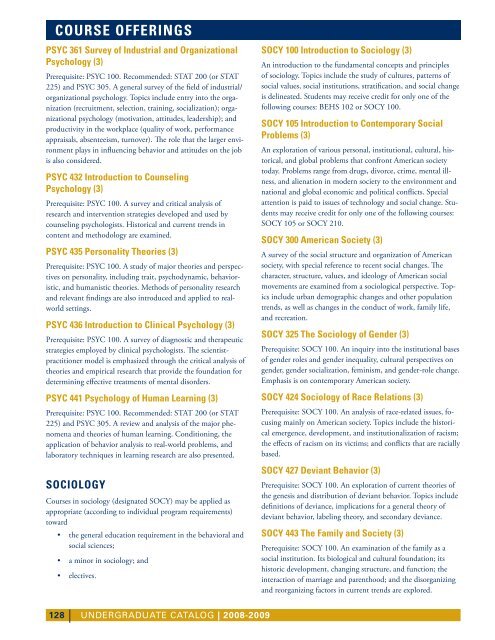welcome to UmUc - UMUC Asia - University of Maryland University ...
welcome to UmUc - UMUC Asia - University of Maryland University ...
welcome to UmUc - UMUC Asia - University of Maryland University ...
Create successful ePaper yourself
Turn your PDF publications into a flip-book with our unique Google optimized e-Paper software.
Course Offerings<br />
PSYC 361 Survey <strong>of</strong> Industrial and Organizational<br />
Psychology (3)<br />
Prerequisite: PSYC 100. Recommended: STAT 200 (or STAT<br />
225) and PSYC 305. A general survey <strong>of</strong> the field <strong>of</strong> industrial/<br />
organizational psychology. Topics include entry in<strong>to</strong> the organization<br />
(recruitment, selection, training, socialization); organizational<br />
psychology (motivation, attitudes, leadership); and<br />
productivity in the workplace (quality <strong>of</strong> work, performance<br />
appraisals, absenteeism, turnover). The role that the larger environment<br />
plays in influencing behavior and attitudes on the job<br />
is also considered.<br />
PSYC 432 Introduction <strong>to</strong> Counseling<br />
Psychology (3)<br />
Prerequisite: PSYC 100. A survey and critical analysis <strong>of</strong><br />
research and intervention strategies developed and used by<br />
counseling psychologists. His<strong>to</strong>rical and current trends in<br />
content and methodology are examined.<br />
PSYC 435 Personality Theories (3)<br />
Prerequisite: PSYC 100. A study <strong>of</strong> major theories and perspectives<br />
on personality, including trait, psychodynamic, behavioristic,<br />
and humanistic theories. Methods <strong>of</strong> personality research<br />
and relevant findings are also introduced and applied <strong>to</strong> realworld<br />
settings.<br />
PSYC 436 Introduction <strong>to</strong> Clinical Psychology (3)<br />
Prerequisite: PSYC 100. A survey <strong>of</strong> diagnostic and therapeutic<br />
strategies employed by clinical psychologists. The scientistpractitioner<br />
model is emphasized through the critical analysis <strong>of</strong><br />
theories and empirical research that provide the foundation for<br />
determining effective treatments <strong>of</strong> mental disorders.<br />
PSYC 441 Psychology <strong>of</strong> Human Learning (3)<br />
Prerequisite: PSYC 100. Recommended: STAT 200 (or STAT<br />
225) and PSYC 305. A review and analysis <strong>of</strong> the major phenomena<br />
and theories <strong>of</strong> human learning. Conditioning, the<br />
application <strong>of</strong> behavior analysis <strong>to</strong> real-world problems, and<br />
labora<strong>to</strong>ry techniques in learning research are also presented.<br />
Sociology<br />
Courses in sociology (designated SOCY) may be applied as<br />
appropriate (according <strong>to</strong> individual program requirements)<br />
<strong>to</strong>ward<br />
• the general education requirement in the behavioral and<br />
social sciences;<br />
• a minor in sociology; and<br />
• electives.<br />
SOCY 100 Introduction <strong>to</strong> Sociology (3)<br />
An introduction <strong>to</strong> the fundamental concepts and principles<br />
<strong>of</strong> sociology. Topics include the study <strong>of</strong> cultures, patterns <strong>of</strong><br />
social values, social institutions, stratification, and social change<br />
is delineated. Students may receive credit for only one <strong>of</strong> the<br />
following courses: BEHS 102 or SOCY 100.<br />
SOCY 105 Introduction <strong>to</strong> Contemporary Social<br />
Problems (3)<br />
An exploration <strong>of</strong> various personal, institutional, cultural, his<strong>to</strong>rical,<br />
and global problems that confront American society<br />
<strong>to</strong>day. Problems range from drugs, divorce, crime, mental illness,<br />
and alienation in modern society <strong>to</strong> the environment and<br />
national and global economic and political conflicts. Special<br />
attention is paid <strong>to</strong> issues <strong>of</strong> technology and social change. Students<br />
may receive credit for only one <strong>of</strong> the following courses:<br />
SOCY 105 or SOCY 210.<br />
SOCY 300 American Society (3)<br />
A survey <strong>of</strong> the social structure and organization <strong>of</strong> American<br />
society, with special reference <strong>to</strong> recent social changes. The<br />
character, structure, values, and ideology <strong>of</strong> American social<br />
movements are examined from a sociological perspective. Topics<br />
include urban demographic changes and other population<br />
trends, as well as changes in the conduct <strong>of</strong> work, family life,<br />
and recreation.<br />
SOCY 325 The Sociology <strong>of</strong> Gender (3)<br />
Prerequisite: SOCY 100. An inquiry in<strong>to</strong> the institutional bases<br />
<strong>of</strong> gender roles and gender inequality, cultural perspectives on<br />
gender, gender socialization, feminism, and gender-role change.<br />
Emphasis is on contemporary American society.<br />
SOCY 424 Sociology <strong>of</strong> Race Relations (3)<br />
Prerequisite: SOCY 100. An analysis <strong>of</strong> race-related issues, focusing<br />
mainly on American society. Topics include the his<strong>to</strong>rical<br />
emergence, development, and institutionalization <strong>of</strong> racism;<br />
the effects <strong>of</strong> racism on its victims; and conflicts that are racially<br />
based.<br />
SOCY 427 Deviant Behavior (3)<br />
Prerequisite: SOCY 100. An exploration <strong>of</strong> current theories <strong>of</strong><br />
the genesis and distribution <strong>of</strong> deviant behavior. Topics include<br />
definitions <strong>of</strong> deviance, implications for a general theory <strong>of</strong><br />
deviant behavior, labeling theory, and secondary deviance.<br />
SOCY 443 The Family and Society (3)<br />
Prerequisite: SOCY 100. An examination <strong>of</strong> the family as a<br />
social institution. Its biological and cultural foundation; its<br />
his<strong>to</strong>ric development, changing structure, and function; the<br />
interaction <strong>of</strong> marriage and parenthood; and the disorganizing<br />
and reorganizing fac<strong>to</strong>rs in current trends are explored.<br />
128<br />
UNDERGRADUATE CATALOG | 2008-2009

















